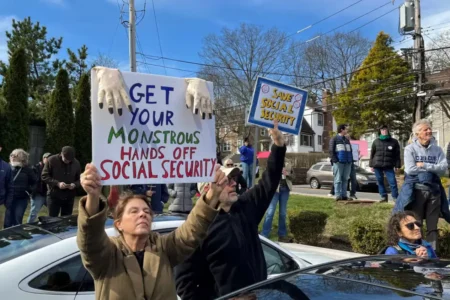In an extraordinary and controversial move, the Trump administration has quietly begun classifying more than 6,000 living immigrants as deceased, stripping them of their legally obtained Social Security numbers and crippling their ability to work, bank, or receive benefits in the United States.
According to two individuals with direct knowledge of the matter, the effort is designed to pressure these immigrants into “self-deporting” — abandoning their lives in the U.S. and returning to their countries of origin.
The officials, who requested anonymity because the plans have not been publicly disclosed, said the immigrants’ names and Social Security numbers are being moved into a federal database traditionally used to track the deceased. The reclassification will effectively cut these individuals off from basic services and institutions that require an active Social Security number, from securing employment to opening bank accounts, renting apartments, and even receiving medical care.
“It’s a strategic chokehold,” one of the individuals said. “By removing their access to the tools of daily life, the administration is betting many will simply give up and leave.”
Trump Administration: A Wider Crackdown
The controversial move is part of a sweeping crackdown targeting immigrants who were granted temporary protections under programs initiated during President Joe Biden’s administration. Many of the affected individuals had legally entered the country using the CBP One mobile app, a system launched by Biden officials to regulate lawful entry and provide a structured pathway for asylum seekers and humanitarian parole recipients.
Just days ago, the Department of Homeland Security (DHS) revoked the legal status of immigrants who used the CBP One app, eliminating their two-year work authorization and residency protections previously granted under Biden’s parole authority. While more than 900,000 immigrants had used the app to enter the country, it remains unclear how the Trump administration selected the 6,000-plus individuals for this particular punitive action.
Immigrant advocates are calling the maneuver unprecedented and deeply alarming.
Legal and Ethical Questions Loom
Immigration and civil rights attorneys are already preparing for a fierce legal battle, arguing that reclassifying living people as deceased could violate numerous federal laws, not to mention due process rights guaranteed under the U.S. Constitution.
“This is not just bureaucratic cruelty — it’s deliberate disenfranchisement,” said Maria De La Cruz, an immigration attorney based in New York. “This action could render people stateless within our borders, making them legally invisible and stripping them of the protections they are entitled to under U.S. law.”
Human rights groups warn that if left unchallenged, the move could set a dangerous precedent for future administrations seeking to circumvent established legal procedures through technical manipulation.
Impact on Daily Life
For the immigrants affected, the consequences are immediate and devastating. Without a valid Social Security number, they face a near-total shutdown of their ability to participate in American life. Many banks automatically flag accounts tied to “deceased” numbers, leading to frozen assets or closures. Employers run mandatory background checks tied to Social Security verification systems, meaning loss of jobs is likely inevitable.
“It’s economic exile,” said Samuel Greene, policy director at the Immigrant Justice Coalition. “You don’t need a wall when you can simply erase people from the system.”
A Strategy Rooted in “Self-Deportation”
The tactic echoes an immigration philosophy Trump officials have long embraced: making life so difficult for undocumented or temporarily protected immigrants that they “self-deport.” Rather than mass roundups or deportation raids, the Trump administration’s strategy relies on economic and social pressures to drive voluntary exits.
However, critics argue that the Trump administration’s plan not only inflicts unnecessary suffering but could also destabilize entire communities and industries reliant on immigrant labor.
Also Read : Visa Fee Surge in Australia: What It Means for Indian Travelers and Workers
